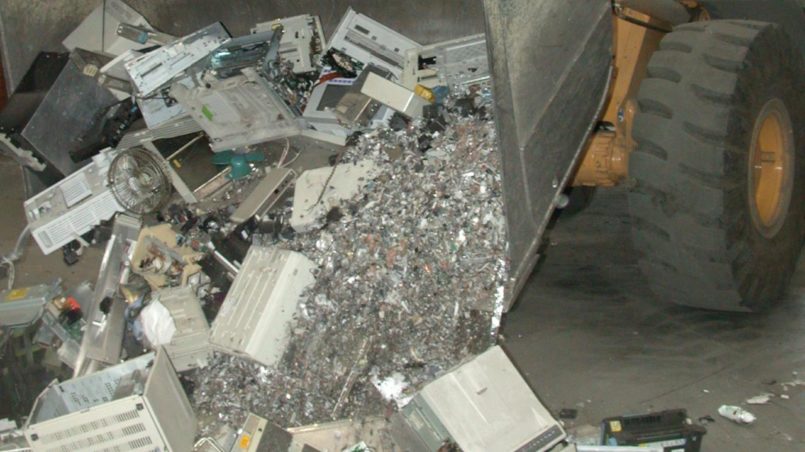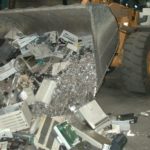Moral Obsolescence – The Question of Awareness

How our societal handling of resources, people and the environment reflects our present state of consciousness.
The somewhat bulky concept of “planned obsolescence” has gained recognition in recent years, not only through documentation such as “Kaufen für die Müllhalde” on Arte. It describes the practice of producing material goods with an artificially limited life. In this article, I would like to deal with the moral questions behind this development – and to point out alternatives.
Before a product such as a mobile phone end up on our shelves, it goes through countless steps in the production process. Thus the plastic parts are provided by suppliers from the mineral oil industry, the “rare earths” built into electronics come from mines e.g. from Africa. Components from all parts of the earth are shipped and, for the most part, assembled in large Chinese factories.
The illogicality need only be great enough and be repeated by all economic actors in order to be considered “normal” and conclusive. We are so poisoned collectively that we regard this as a given and accepted element of our economic order.
How is a consumer to exercise his power when there is no information about the product? Much worse, how is he to do it if all market actors apply the same principles? Unfortunately, we have arrived at a situation where proper action becomes increasingly difficult and in many places virtually impossible. Everything is subjected to the constraints of profit maximization.
Meanwhile the artificial shortening of a product’s life span is no longer the manufacturer’s only possible strategy to artificially produce demand. Rather, a kind of psychological mechanism of obsolesence can be observed.
New products, which differ only very slightly from the previous generation, are hammered into the consumer’s consciousness, partly with astronomical advertising budgets. The resulting market behavior is particularly evident in the automotive sector. New models that, in a nutshell, also have four tires and a steering wheel, are celebrated every passing year, in endless repetition, as the unprecedented zenith of the driving experience.
The price of material excess
The impact of this approach is one of the biggest problems of our time, both for society as a whole and ecologically.
A production cycle of madness
Supplier companies operate mines for rare earths in countries of the Third World, on behalf of international corporations. Most people there work under slave-like conditions and high health threats. Mercury is often used in the mines, or radioactive sediment layers are exposed, which the workers are not protected from.
The materials are then exported via cargo aircraft or crude-oil operated freight ships. For the most part, China is the first destination. In large factories, e.g. those of Foxconn or Pegatron, the largest contract manufacturers for companies such as Apple, Samsung, Nintendo, Sony and Co., the majority of workers come from poor rural areas and work for wages which are partly not even a third of the usually applicable minimum security rates.
Without a significant amount of overtime, it is impossible to earn a salary on which to get by in the areas concerned. Foxconn has also come into disrepute because of the numerous suicides among the exploited workers.
Through the financial power of these corporations, which often have more capital than individual industrialized countries, it becomes possible to put considerable pressure on politics. One of the features of this power is the tax policy, which allows the corporations to annually withhold one-thousand billion euros in tax payments from the European Union alone. The principle of “paying third world wages, collecting Western world prices and avoiding taxes as much as possible” is one of the most lucrative business models of our time.
The company Apple alone made a profit of nearly 18 billion US dollar last year.
Corporations are now operating globally. This has made it harder for governments to control their activities; irrespective of whether or not one can trust corporations, the state is no longer the regulating authority against the economy, which it still was 50 or 60 years ago. […]
Governments are now powerless.
Sam Gibara, former CEO of Goodyear
It does not require brain acrobatics to understand where these conditions lead us. With each product we have purchased, produced under the above circumstances, we consciously or unconsciously give these methods a legitimation – without realizing that we are the losers at the end of this logic chain.
In the end, we also say yes to the abolition of our achievements in civilization, as these corporations, by virtue of their incredible financial power, have the power to chase mostly nationally acting and thinking politics with their international power structures.
Also, it is us who have to pay literally double for these products . Because of the corporations’ refusal to participate adequately in the states’ tax revenue, we – mostly the middle class – end up having to pay for the lost taxes.
Anyone who believes that our consumption behavior as well as our economic ethics only causes victims in the Third World has to reconsider in the light of these facts. We are all affected!
In the second part of the article, I would like to deal with solutions and alternatives to this madness.
Translation from German: Serena Nebo
Credits
| Image | Title | Author | License |
|---|---|---|---|
 |
E-waste | Volker Thies | CC BY-SA 3.0 |
